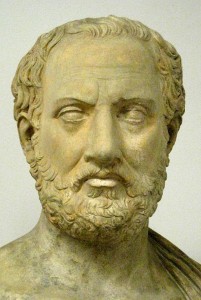 The great Athenian historian Thucydides said that there are three causes of war: (1) honor (2) fear (3) national interest.
The great Athenian historian Thucydides said that there are three causes of war: (1) honor (2) fear (3) national interest.
Jonah Goldberg discusses those factors and cites modern historian Donald Kagan, who says that honor comes first as the reason why a nation goes to war. That motive is far more common, he says, than national interest.
World War I was surely caused by many nations’ sense of honor. World War II was caused by Germany and Japan’s radical sense of national pride and the honor (and territory) to which they felt entitled. Other countries fought them out of the rational fear that leads to self-defense. The Cold War conflicts were sparked by ideology–should that modern concept be added to Thucydides’ causes?–but our national honor, if not our national interests, were at stake in Vietnam.
More recently, the Iraq War had as its official reason our fear of weapons of mass destruction, but we were also humiliated and outraged at the 9/11 attacks and our sense of honor required us to strike back at somebody. It is said that Muslims have felt humiliated by the West for centuries, and this is a major motive for Islamic terrorism.
Goldberg applies Thucydides to the Mexicans and the wall. He says that having a wall on the border may well be a good idea. But if it is worth building, we should pay for it. There is no need, he says, to humiliate Mexico by somehow forcing them to pay for it. Not that Mexico would start a war, but that foreign policy should avoid needless insults to the honor of a country.
Donald Trump is building up American honor in the course of “making America great again.” Does that mean that an America conscious of its greatness would be more likely to start a war if another country insults us? But Trump is saying that the driving force of his government will be the national interest. Ironically, attention to the national interest is the least likely cause of war, and it can keep us out of conflicts based merely on honor or fear.
From Jonah Goldberg, Donald Trump’s Border Wall Shouldn’t Cost Mexico Money & Honor | National Review:
The Greek historian Thucydides argued that countries go to war for three reasons: honor, fear, and interest. He put honor first, and yet that is probably the least appreciated aspect of foreign policy today. Historian Donald Kagan, in his essay “Honor, Interest, Nation-State,” recounts how since antiquity, nations have put honor ahead of interest. “For the last 2,500 years, at least, states have usually conducted their affairs and have often gone to war for reasons that would not pass the test of ‘vital national interests’ posed by modern students of politics.”
“On countless occasions,” he continues, “states have acted to defend or foster a collection of beliefs and feelings that ran counter to their practical interests and have placed their security at risk, persisting in their course even when the costs were high and the danger was evident.”
Americans instinctively understand this when our own honor is at stake. The rallying cry during the Barbary Wars, “Millions for defense, but not one cent for tribute,” has almost become part of the national creed. I am no fan of Karl Marx, but he was surely right when he observed that “shame is a kind of anger turned in on itself. And if a whole nation were to feel ashamed it would be like a lion recoiling in order to spring.”
Both the first and second world wars cannot be properly understood without taking seriously the role national honor plays in foreign affairs. Similarly, Vladimir Putin’s constant testing of the West only makes sense when you take into account the despot’s core conviction that the fall of the Soviet Union was a blow to Russian prestige and honor.
Now, I don’t think a war with Mexico is in the cards, even if the Trump administration were to figure out a way to get Mexico to foot the bill for a border wall. But forcing them to pay for it would be a punitive and gratuitous act of humiliation.
Bust of Thucydides, a Roman copy (c. 100 CE) of an early 4th Century BCE Greek original, located in Holkham Hall in Norfolk, UK. Photo by user:shakko (Own work) [CC BY-SA 3.0 (http://creativecommons.org/licenses/by-sa/3.0)], via Wikimedia Commons




